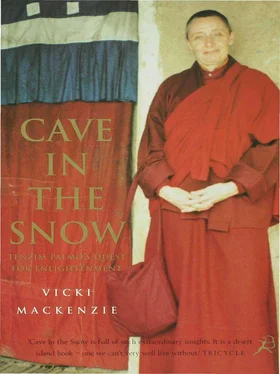‘It’s a poverty of our time that so many people can’t see beyond the material,’ she said. ‘In this age of darkness with its greed, violence and ignorance it’s important there are some areas of light in the gloom, something to balance all the heaviness and darkness. To my mind the contemplatives and the solitary meditators are like lighthouses beaming out love and compassion on to the world. Because their beams are focused they are very powerful. They become like generators and they are extremely necessary.
‘Even as I travel around the world I meet people who say how inspired they’ve been by my being in the cave,’ Tenzin Palmo continued. ‘I got a letter from a woman who said that her son was dying of AIDS and that in the moments of her deepest depression she’d think of me up in my cave and that would give her solace. It’s true of many people leading this life. I know Catholics who feel inspired that Christian contemplatives are praying for the world’s sinners.
What people have to remember is that meditators in caves are not doing it for themselves – they’re meditating on behalf of all sentient beings.’ And her words were reminiscent of that old Eastern saying that if it weren’t for the meditators directing their prayers to the welfare of all humanity the sun wouldn’t rise every morning in the East. And didn’t Pascal say that the whole of the world’s troubles was because man could not sit still in his room?
But for Tenzin Palmo, the woman, the option had been easy. She had never for a second yearned for a child. She had never known the ache of maternal instinct unfulfilled. Nor had she ever had to balance the demands of motherhood and domestic responsibility with the call for spiritual development, like so many women were trying to do. Western mothers like Tsultrim Allione tried to get round the problem by allowing her children into her meditation sessions (where they climbed all over her). Other women were reduced to getting up before dawn to get in the prescribed hours of practice before getting their children off to school. They would then juggle other sessions between the cooking and the laundry and would finish off late at night doing their final session after the children were in bed. Tibetan mothers like Machig Lobdron (the famous yogini of Tibet) solved the problem by simply leaving her children with her husband for months on end in order to practise. In reality therefore was motherhood a disadvantage to spiritual progress?
‘We do different things in different lifetimes,’ Tenzin Palmo answered. ‘We should look and see what in this lifetime we are called to do. It’s ridiculous to become a nun or a hermit because of some ideal when all the time we would be learning more within a close relationship or a family situation. You can develop all sorts of qualities through motherhood which you could not by leading a monastic life. It’s not that by being a mother one is cutting off the path. Far from it! There are many approaches, many ways. What is unrealistic, however, is to become a mother or a businesswoman and at the same time expect to be able to do the same kind of practices designed for hermits. If women have made the choice to have children then they should develop a practice which makes the family the dharma path. Otherwise they’ll end up being very frustrated.
‘Actually, everything depends on one’s skilful means and how much determination and effort one puts into it,’ she went on. ‘Whether one is a monk, a nun, a hermit, a housewife or a businessman or woman, at one level it’s irrelevant. The practice of being in the moment, of opening the heart, can be done wherever we are. If one is able to bring one’s awareness into everyday life and into one’s relationships, workplace, home, then it makes no difference where one is. Even in Tibet the people who attained the rainbow body were often very “ordinary” people who nobody ever knew were practising. The fact is that a genuine practice should be able to be carried out in all circumstances.’ She paused for a moment, then added: ‘It’s just that it’s easier to do these advanced practices in a conducive environment away from external and internal distractions. That’s why the Buddha created the sangha. Very close relationships can be very distracting, let’s admit it.’
It was an essential codicil. What Tenzin Palmo was in fact saying was that while much spiritual development can be achieved within the home or the office, the cave remained the hothouse for Enlightenment. It was what they had always said.
’The advantage of going to a cave is that it gives you time and space to be able to concentrate totally. The practices are complicated with detailed visualizations. The inner yogic practices and the mantras also require much time and isolation. These cannot be done in the midst of the town. Going into retreat gives the opportunity for the food to cook,’ she said, ironically launching into the language of the kitchen to get her meaning across. ‘You have to put all the ingredients into a pot and stew it up. And you have to have a constant heat. If you keep turning the heat on and off it is never going to be done. The retreat is like living in a pressure-cooker. Everything gets cooked much quicker. That is why it is recommended.
‘Even for short periods, it can be helpful. You don’t have to do it all your life. I think it would be very helpful for many people to have some period of silence and isolation to look within and find out who they really are, when they’re not so busy playing roles – being the mother, wife, husband, career person, everybody’s best friend, or whatever fagade we put up to the world as our identity. It’s very good to have an opportunity to be alone with oneself and see who one really is behind all the masks.’
In this light, she declared, the hermitage or cave would never be an archaic ideal, as some were suggesting. And for as long as certain individuals, like herself, had the yearning to pursue the lonely inner path, away from the hustle and bustle of ordinary life, then the cave would always exist, in one form or another. ‘Is the search for reality old-fashioned?’ she stated more than asked. ‘As long as the search for spiritual understanding is valid, so is the cave.’
Tenzin Palmo, out in the world, had come into contact with many of the new women agitating to put a more feminine face on the Buddha, and applauded their efforts. ‘The push by the women to introduce these changes is going to be one of the greatest contributions the West is going to make to the dharma,’ she said. Over the years she had developed an interesting relationship with the strongest proponents. Like them, her goal was equality of opportunity for all women in the spiritual arena. Like them, she abhorred the latent misogyny of the Patriarchal system. Like them, she was fiercely independent, intent on forging her own way ahead regardless of the obstacles. Like them, she was outspoken against discrimination and injustice wherever she found them. But, unlike them, she did not think the full-frontal attacks often employed by the feminists worked. And, in her inimical fashion, she told them so.
’These angry feminists! I come up against them all the time. They have this whole idea of righteous indignation which they use as fuel to oppose whatever they think is unjust. They direct an enormous amount of anger towards men, as though they were the perpetrators of all evil. Frankly I don’t think all this anger helps. And I tell them so. Anger is simply anger, we use it to justify our own negative states. We all have a huge reservoir of anger in us and whatever we direct it to only adds oil to the fire. If we approach something with an angry mind what happens is that it leads to antagonism and defensiveness in the other side. The Buddha said hatred is not overcome by hatred, but only by love.
Читать дальше












